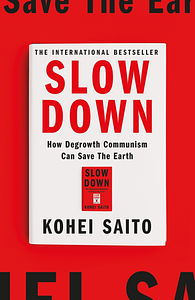You need to sign in or sign up before continuing.
Take a photo of a barcode or cover
hopeful
informative
inspiring
fast-paced
informative
slow-paced
challenging
hopeful
reflective
medium-paced
challenging
hopeful
informative
inspiring
reflective
sad
medium-paced
A fascinating take on how the later discovered works of Marx could form the basis of the model that will save us from ourselves - degrowth communism. This is also a lesson in accepting the evolution of ideas and not being wedded to past definitions or experiences (in this case, the heavily tainted “communism”).
I used the audiobook to push me through this book. I found it hard to connect with the central arguments of the book. I would miss parts of the book, but not felt I missed enough to justify going back to hear them again. I agree that the climate situation is urgent but am not ready to abandon "green new deal" type of solutions which do recognize the existing inequalities and address these in addition to the decarbonization efforts. A book with less detail (deep dives, but repeated excessively in my view). Too much of the initial part of book was spent trying to connect with what Marx "really" intended. I do agree that in many respects privatization and inequalities of wealth (and the influences and priorities given to the wealthier) have gotten extreme. Too much time and effort are spent just to grow wealth, rather than to live a quality life - I get that. There isn't a clear roadmap presented to change toward this proposed ways of doing things.
challenging
hopeful
informative
inspiring
fast-paced
Slow Down clearly and cogently presents a multivalent solution to the climate crisis and the miseries of capitalism. Whether we are ready to hear it, is another issue. Author Kōhei Saitō concedes that what he is proposing would be a hard sell both politically and to even the casual reader. I would argue that the difficult realities in facing up to our complicity here in the Global North with what Saitō describes as the “imperial mode” of living is exactly what makes his argument feel so legitimate, urgent and obvious. What is abundantly clear is that the planet will continue to get warmer and less habitable as long as capitalism is the prevailing economic system. Continued indefinite GDP growth of the larger national economies only serves to superficially distract and disassociate us at the expense of the people and communities of the Global South, who bear most of the brunt of the environmental destruction caused by that unchecked economic expansion. Saitō’s answer is something many on the left who have read any Marx have known for a while – that the problem is capitalism itself. And Saitō does not just mean the current neoliberal iteration of capitalism, but the fundamental system of exploitation, profit and artificial scarcity that has mostly benefited only the wealthiest 1% of society at the expense of the other 99% since the dawn of the industrial age. The author wisely concludes that capitalism is bound up with and exacerbates the struggles around race, gender, and human rights, and that the neoliberal turn has fostered a cynical suspicion and hopelessness in us that disincentives consideration of alternatives such as he here is proposing. Time will tell if Saitō’s argument will seriously inspire enough people to resist the ongoing march of capital toward’s humanity’s doom. Hopefully by the time it does, there will be time enough to mitigate a global climate disaster that has already begun.
informative
informative
sad
medium-paced
informative
inspiring
slow-paced
love the idea but this book was really boring and focused way more on trying to convince readers that Marx's ideas fit a more modern context without the author adding much of his own to the conversation.
informative
reflective
slow-paced





